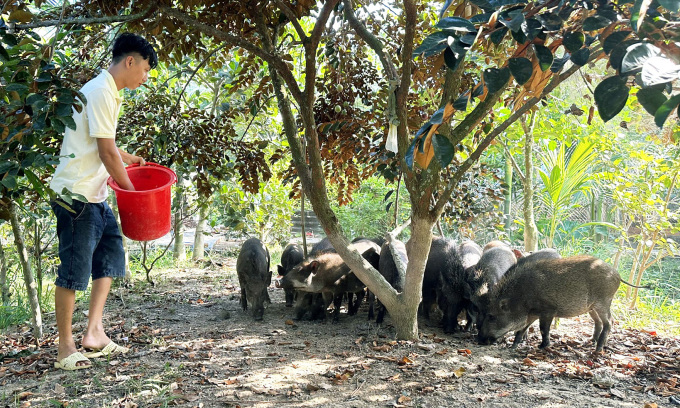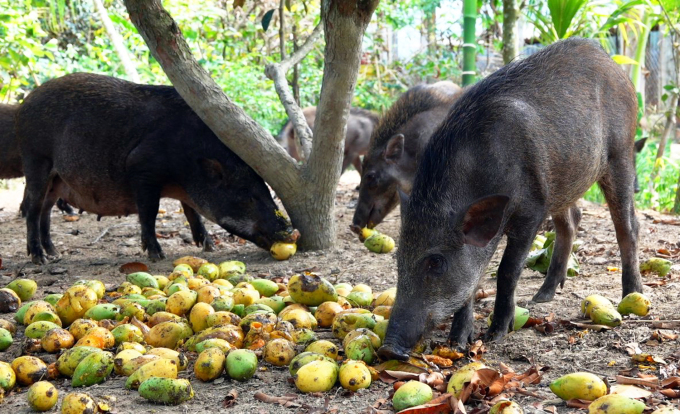Soc TrangMr. Nguyen Tan Dat, 34 years old, in Ke Sach district, raises wild pigs with fruits combined with soybeans and beer wort, earning a profit of more than 800 million VND each year.
Having no experience in animal husbandry, but passionate about agriculture, after graduating with a major in philology from Vo Truong Toan University (Hau Giang) in 2014, Mr. Dat spent hundreds of millions of dong with friends to raise wild pigs and plant fresh vegetable. After a period of effective capital contribution, he withdrew from the group and started his own business.
In 2016, seeing that his family had a fruit garden of more than 3,000 square meters, Mr. Dat decided to start from scratch with the model of raising semi-wild wild boar. Understanding that wild boars like to dig and destroy, he built a cage with walls, a sturdy fence nearly 2 meters high, and a concrete floor. The barn is divided into areas to manage the herd. From the original 20 parent pigs, Mr. Dat expanded his herd to hundreds of pigs.

Wild boar herds are raised in a semi-wild form. Image: An Minh
According to Mr. Dat, wild boar meat is delicious, the skin is thick, crispy, and sweet, but currently in the Mekong Delta there is a lot of cross-breeding, reducing the quality. Therefore, he applies a pig raising model that combines confinement and free range. Pets are mainly fed fruit combined with organic food, rich in plant protein such as soybean residue and beer wort.
“In addition to the fruits in my garden that do not meet standards and are criticized by traders, I also buy them in many localities at cheap prices. Fruit is a food that supplements many vitamins, minerals and fiber for wild boars,” he said. Dat said farmers need to increase or decrease the amount of fruit each day depending on the pig’s condition to balance nutrition.
Supplemented with fruit, wild boar grows quickly, has delicious, firm meat, no bad smell and has fewer diseases than when raised only with industrial feed. With this approach, he also saves investment costs, each pig only costs about 8,000 VND per day.
Mr. Dat combined a number of farms in Binh Thuan and Dak Lak to have quality seed sources. Besides, the farm owner strictly controls the weight gain process, each month a cow gains no more than 6 kg. This helps wild boar maintain its inherent delicious and sweet meat quality.
Talking about his experience raising wild boars, Mr. Dat said he had to go through many years of visiting farms, learning and researching documents. Owners need to understand the characteristics and growth process of pigs, to adjust care and nutritional balance from time to time.
“Doing agriculture requires perseverance. I myself failed twice and lost billions of dong before stabilizing,” the farm owner said.

Wild boars eat a lot of fruit, which helps the quality of their meat to be juicy and delicious. Image: An Minh
Pigs raised for about 6 months are sold commercially by the farm owner. Breeding pigs are only sold when they reach 20 kg or more to ensure good breed quality and no hybridization. Currently, the price of wild boar meat is about 130,000-150,000 VND per kg, the price of breeding pigs is twice as high. Each year Mr. Dat’s facility supplies the Western market with more than 1,000 pigs, each generating a profit of 500,000-800,000 VND.
Currently, Mr. Dat’s farm has a certificate of regular forest animal farming for commercial purposes from the Forest Protection Department of Soc Trang province, and a certificate of registration of the environmental protection plan from the District People’s Committee.
According to the local government, Mr. Dat’s model of raising wild boars in organic orchards is highly effective, opening up new directions for future development.
Cheers Ly



